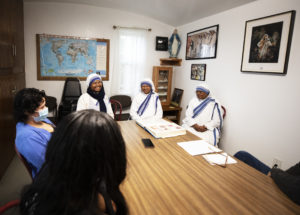In a saga that has been well documented in recent weeks, the Los Angeles Dodgers recently issued an invitation, retracted it, then, under mob pressure, issued a groveling apology and implored a group of “drag nuns” who call themselves, all in good fun, of course, The Sisters of Perpetual Indulgence, to participate in an upcoming Pride Night celebration at Dodger Stadium.
The good fun includes, but is far from limited to, an annual Easter event called the Hunky Jesus and Foxy Mary contest, pole-dancing, and simulated sodomy around a “camp” reenactment of the crucifixion, a pregnant “Free Choice” Mary, and a Condom Savior Mass.
The group, led by such stalwarts as “Sister Homo Fellatio” and “Sister Joyous Reserectum,” also provides “community service, ministry, and outreach.” Wonderful. But it goes without saying that if such philanthropic work were underlain by lewd caricatures and the use of items reverenced by say, Native American female elders or women ministers of the African Methodist Episcopal (A.M.E.) church as sexual props, it would instantly, deafeningly, and rightly be called out as the hate crime it is.
I am 100% behind the First Amendment. Say, do, dress, believe, act out, gather as you like on your own turf. But to present such a group as heroic in the home of a baseball team beloved by, and thereby at least putatively representative of, the people of Los Angeles, may represent a new low in the collapse of shared civic values.
To object is not “anti-LGBTQ.” It is pro-acknowledging the lie beneath the notion that the feelings of one group are so finely tuned that not being invited to participate in an annual “Pride Night” will result in suicide, while the feelings of another group whose vocations, work, and lives of service are poised to be publicly desecrated count for nothing.
Establishing the threshold test for obscenity in the 1964 Supreme Court decision, Jacobellis v. Ohio, Justice Potter Stewart famously wrote:
“I shall not today attempt further to define the kinds of material I understand to be embraced within that shorthand description [‘hardcore pornography’], and perhaps I could never succeed in intelligibly doing so. But I know it when I see it.”
The same could be said of the sacred. Perhaps we can’t define it, but we know it when we see it.
Take some of the more than 1,000 real nuns who serve the Greater Los Angeles area: the Little Sisters of the Poor, for example, who from their facility in San Pedro have for decades sheltered, ministered to, fed, and cared for the elderly of slender means.
Take the Sisters of the Good Shepherd, an order founded in 1641 in France to help prostituted women that now serves more than 70 countries. A presence in LA for 120 years, since 1977 Good Shepherd has operated a shelter, school, and garden for female victims of domestic abuse and their children.
Sister Anne Kelley, executive director of the Good Shepherd Shelter for 21 years, observed in a 2015 interview, “The work is really, really dangerous. And the women who come here are really, really brave.”

The Missionaries of Charity at St. Emydius Church in Lynwood care for the homeless, teach catechism, attend to the needs of the infants and pregnant mothers who live with them in the convent, and distribute food to the needy in their neighborhood.
The Servants of Mary live in West Adams and go, upon being asked, into people’s homes as they’re sick or dying to sit vigil with them, pray with them, talk to them, tidy their house, or simply sit.
Those they serve can be young, old, gay, straight, transgender, atheist, Muslim, Jewish. They can be rich or poor. The sisters will accept no money, including government money. Those who keep the night watch sleep during the day.
Could discriminating against or mocking Catholicism be as morally wrong as any other form of racial, sexual, economic, or religious discrimination? Nonsense. Mind your own business and tend to your pedophile priests, we are often told.
But the revulsion, shame, and sorrow we feel at the violation of the human body, spirit, and soul must also recoil, and for the same reasons, at the grotesque mockery of our religious sisters.
Whatever their personal faults and failings, Catholic sisters are a sign of a dimension beyond this one. They have taken lifelong, sacramental vows. They strive for purity, holiness, and an entire surrender of self in favor of the greater good. As such, they deserve the respect of all people of goodwill. They are exemplars for those of us who strive for similar things.
If religious sisters are not sacred, then neither are innocent children. If religious sisters are not sacred, then neither are the poor, the sick, and the alien who hunger and thirst for righteousness.
If religious sisters are not sacred, then neither is the man who, when the mob has melted away, and the makeup, wig, and costume have been removed, is revealed, like all of us, to be a naked soul crying out in the wilderness, desperate for a human touch, redemption, mercy.
“Take good care of the elderly,” said St. Jeanne Jugan, foundress of the Little Sisters of the Poor, “for it is Jesus himself you are caring for in them.”
“They are absolutely fearless, they go anywhere that they think they can help,” says St. Emydius’ Father Cesar Guardado of the Missionaries of Charity.
“I was sick and you visited me” (Matthew 25:36), the Servants of Mary take as their mandate.
“They so want someone to sit with them, just to be with them,” one sister remarked of her patients. “Nobody wants to die alone.”
Or as French writer Charles Péguy wrote, “We must all be saved together! Reach God together! Appear before Him together! We must return to our Father’s house together … what would He think if we arrived without the others, without the others returning, too?”

